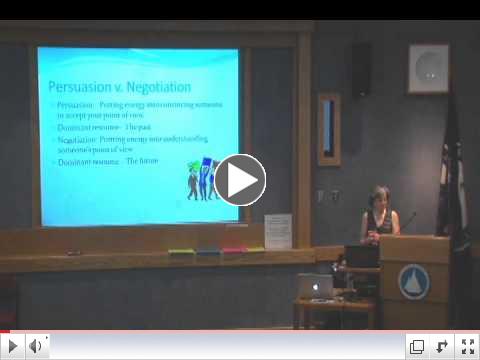Conflict Resolution Newsletter
by Alternative Resolutions, LLC
February 2013 - Vol 3, Issue 2
|
|
|
|
Quick Links
 | | Negotiation Tips |
| |
|
| New website feature: our prior newsletters are now available on our website!!! |
|
Company News and Recent Publications | |
Just published...
Newly Revised Fact shet
The High Cost of Conflict Email us for a copy.
New roster...
Ellen Kandell was recently approved to join the mediator list for Montgomery County Circuit Court custody disputes.
Check out our recent radio interview on mediation and dispute resolution. To listen click here.
|
|
|
|
Greetings! | |

Embrace conflict, put your arms around it...Happy Valentine's Day!! While it's very hard work, productive management of conflict results in growth and change. It has the capacity to transform relationships. That's why we do this work.
This month's article continues our series on leadership and conflict resolution. |
Demagogue, Manager or Mediator: What Kind of Leadership Style do you Use? | |
The premise of Mark Gerzon's book,Leading Through Conflict is that a new model of leadership embraces the characteristics of a mediator.Mark Gerzon, Leading Through Conflict:How Successful Leaders Transform Differences into Opportunities, Boston, MA: Harvard Business School Press, 2006.Each chapter of his book focuses on a particular mediator tool with detailed profiles of leaders who are using the various tool in diverse sectors of the economy.We will be featuring these tools in upcoming editions of this newsletter.
To better understand how innovative and radical this approach is we need to examine some existing leadership styles and their deficiencies.
The Demagogue: This is a more dangerous style of leadership and is displayed by dictatorial leaders, or irate tyrants and classroom bullies. The demagogue leads through fear, threats and intimidation, turns opponents into scapegoats, uses lies and propaganda to dehumanize the "other" and resorts to violence to dominate or destroy. These kind of leaders disdain the very idea of transforming conflict into positive change. Communication is manipulated so that safe communication and constructive feedback isn't possible. History contains many examples of this leadership type. We've seen countless examples in genocide in Rwanda, Darfur, Syria and Bosnia, to name a few. This is the most destructive form of leadership. When demagogues emerge it is incumbent upon us to quickly identify the neutralize them.
Id.
The Manager: While competent and efficient managers are a necessary component of organizations there are some significant limitations to this style of leadership. Managerial leaders solve problems in a top down manner. They make decisions unilaterally. Their focus is on"us", the group they manage so they tend to get territorial. Many of today's organizational problems cross boundaries and need leaders who don't simply consider the impacts of changes on their discrete group. The manager leadership style has a narrow perspective on interests.
The Mediator: Gerzon proposes that our future crop of leaders will have the characteristics of a mediator. Unlike the manager mindset, the mediator strives to act on behalf of the larger group, thinks broadly and systemically about problems and looks to build bridges across any divides. Gerzon identifies these tools as follows: integral vision, systems thinking, presence, inquiry, conscious conversation, dialogue, bridging and innovation. While these tools are not steps in the mediation process they are characteristics that mediators inherently possess in their heart and soul or develop through the process of peacemaking.
Next month: Integral vision and systems thinking
|
|
|
|
|
Theory Application TIPS | |
TIPS for leaders handling conflict. Ask yourself the following questions:
- Whose interests are you considering when making decisions?
- Are any groups marginalized?
- Are fear and threats present in any of your messages?
- Are you looking at the impact of your decisions on the organization as a whole?
·
Do you have questions about this month's article? We'd like to hear from you Email us now! |
|
Conflict Resolution in the Community: Upcoming Events | |

Basic Mediation Training, June 2013. Email us for further information.
February 14, 2013 Embrace Conflict: Resolution Tips for Business Owners, Olney Rotary Club, Olney MD
March 8, 2013 The Ethics of Counseling Your Clients on Workplace Issues, Columbia, MD
March 15, 2013 Expanding Your Practice to Collaborative Counseling, Columbia, MD
Classes in collaboration with Dr. Gloria Vanderhorst.
To register go to http://www.mentalhealthceus.eventbrite.com/ |
|
We look forward to being your partners in productive, proactive conflict resolution endeavors. If you are a new reader or didn't request a copy previously please email us for a free copy of our organizational needs assessment. Put your organization in a conflict healthy environment.
Sincerely,
Ellen |
|
Ellen F. Kandell, Esq.
Alternative Resolutions, LLC
|
|
|
|
|